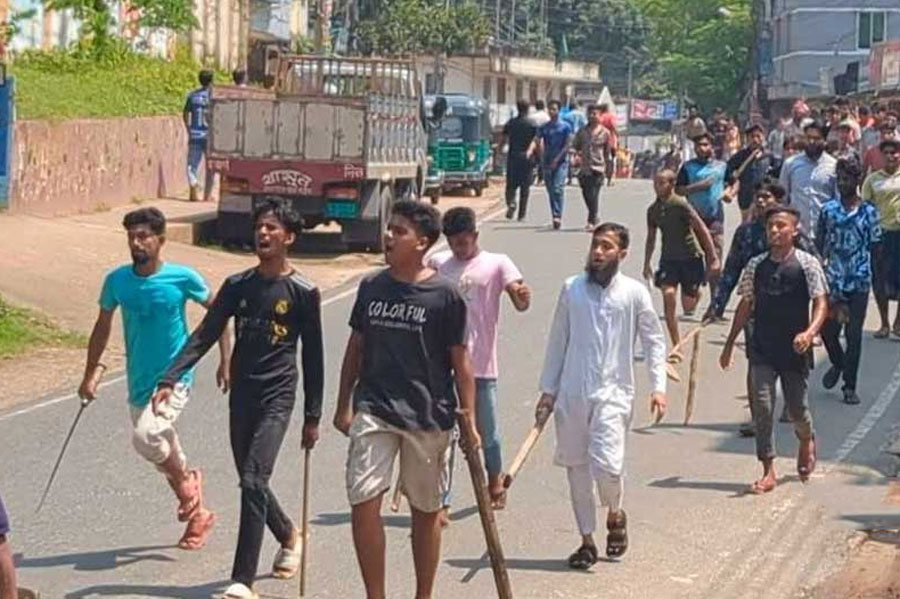
Published :
Updated :

At a time when sobriety, tolerance and logic should have prevailed over impulsiveness, intolerance and irrationality, society has turned into a psychological tinderbox. It is flaring up anywhere anytime, consuming not just the target victims but also other innocent people. The psychological morbidity is unfolding in myriad ways. Worst, it is not limited to any particular social class, groups or profession. Thus the floodgates of violence and mayhem have opened like an epidemic. The latest such incidents concern the beating of two men to death, of all places, at two public universities and the clashes and arsons in Khagrachhari and Rangamati.
Some people have definitely gone berserk taking advantage of the overcharged ambience following the vacuum created in the enforcement of law and order due to the disappearance of the discredited police. Anti-social elements, the repressed with long pent-up anger and others revelling in sadism, it seems, find it a perfect opportunity to test the limit of tolerance of the new extempore administration. Yes, they consider it an arrangement made in haste in order to fill up the administrative vacuum. Or, no sane person would have distracted the government causing so much disruption.
By all reckonings, the unresolved protracted ethnic minority issue cannot be dismissed as any other conflict. Because involved with it is the sovereignty of the country. The other minority problems such as the religious one and the indigenous people like the Santhals in the country's north, who also suffered the majoritarian onslaught with the statues of the anti-British rebellion-famed heroes Sidhu and Kanhu Murmu getting defaced, are definitely grave but do not carry inherently the threat of separatism. The neighbourly separatist movements by the Arakan Liberation Army, Kachin Independence Army and Karen National Liberation Army have all posed a serious threat to the Myanmar state's sovereignty. But the threat extends beyond the border of Bangladesh's hill districts and India's seven sisters in the north-east to the unease of both Bangladesh and Indian governments.
This is why students from ethnic communities from a protest rally at a university had to declare, "We are integrationists, not separatists". Termed a highly sensitive issue, it should rather be considered more delicate than ever particularly at this critical period of tense regional and global geo-politics. The problem with the largely homogenous demography is that the religious legacy, much as it is tried to be covered by rhetoric of contrived harmonious relations, hardly recedes from mental space. This is mostly because the cultural space has shrunk and the liberal concept of religious harmony in diversity is limited to a very select enlightened segment of society. The proliferation of devices for easy information ---better say disinformation --- and communication has not helped the cause. But the modern gadgets could be a powerful tool if only those were not abused but properly used. Social sites, through spreading rumour and disinformation, have been causing more harms than good.
The latest flare-up of conflicts between the ethnic hill people and the Bangalee settlers cannot be isolated from similar strife that bedevils relations between peoples divided on religious lines such as in Palestine. So, it is necessary to make as much socio-economic and cultural space as possible for the religious minorities for national integration. It is not for nothing that the protesting indigenous students of different universities have demanded full implementation of the Chittagong Hill Tracts (CHT) Peace Accord, 1997 and the Chittagong Hill Tracts Act (Amended), 2003.
An issue of this order is beyond the interim government's jurisdiction. But it can somehow accommodate some legal bindings for the next government to follow. If the unimplemented provisions are not contrary to the country's sovereignty as provided by the constitution, this government can start the process as a token of goodwill so that the next elected government finds the full implementation easier and smoother.
nilratanhalder2000@yahoo.com


 For all latest news, follow The Financial Express Google News channel.
For all latest news, follow The Financial Express Google News channel.